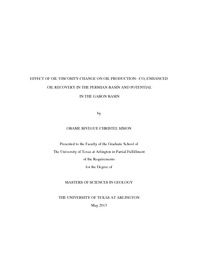
ATTENTION: The works hosted here are being migrated to a new repository that will consolidate resources, improve discoverability, and better show UTA's research impact on the global community. We will update authors as the migration progresses. Please see MavMatrix for more information.
Show simple item record
| dc.contributor.author | Obame Bivegue, Christel Simon | |
| dc.date.accessioned | 2016-01-28T18:03:46Z | |
| dc.date.available | 2016-01-28T18:03:46Z | |
| dc.date.submitted | January 2013 | |
| dc.identifier.other | DISS-12219 | |
| dc.identifier.uri | http://hdl.handle.net/10106/25548 | |
| dc.description.abstract | With most oil fields around the world reaching maturation it is not uncommon for oil companies to investigate the possibility of implementing CO₂ Enhanced Oil Recovery. The injection of CO₂ in a reservoir reduces the oil viscosity within the reservoir, which can later be more easily pushed towards a producing well. Computer simulators such as BOAST NFR are key tools in order to simulate the response of a reservoir to CO₂ EOR and predict oil production. This thesis investigates an example of CO₂ EOR in the Gabon Basin where such technique has yet to be implemented. Oil production has been on the decline since the late 90s and the implementation of CO₂ EOR should not be overlooked. Estimates of a possible non neglectable oil production in the Rabi-Kounga oil field can be predicted using actual physical characteristics of both oil and reservoirs. CO₂ EOR has proven to be very successful in the Permian Basin where CO₂ yet has to be brought from distant sources using an elaborate network of pipelines. In the Gabon Basin however, natural gas is readily available in great quantities which reduces the scale of infrastructures needed. | |
| dc.description.sponsorship | Qinhong Hu, Max | |
| dc.language.iso | en | |
| dc.publisher | Environmental & Earth Science | |
| dc.title | Effect Of Oil Viscosity Change On Oil Production: CO₂ Enhanced Oil Recovery In The Permian Basin And Potential In The Gabon Basin | |
| dc.type | M.S. | |
| dc.contributor.committeeChair | Qinhong Hu, Max | |
| dc.degree.department | Environmental & Earth Science | |
| dc.degree.discipline | Environmental & Earth Science | |
| dc.degree.grantor | University of Texas at Arlington | |
| dc.degree.level | masters | |
| dc.degree.name | M.S. | |
Files in this item
- Name:
- Obame_uta_2502M_12219.pdf
- Size:
- 3.002Mb
- Format:
- PDF
This item appears in the following Collection(s)
Show simple item record


